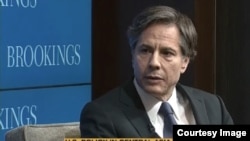It’s been nearly 23 years since the United States recognized the independence, sovereignty and the territorial integrity of Kazakhstan, Kyrgyzstan, Tajikistan, Turkmenistan, and Uzbekistan. Indeed, we were among the first governments to do so. Since then, “the lens through which we view Central Asia may have changed, but our commitment to enduring partnerships that advance our interests and values in the region has not,” said Deputy Secretary of State Anthony Blinken:
“And the reason for this is simple: Our security is tied to a stable Central Asia, and at the same time we see a region of enormous potential, a region that could act as an economic bridge from Istanbul to Shanghai and provide opportunities for our own businesses, technologies, and innovations to take root; a region that could offer goods and energy to the booming economies of South and East Asia; and a region that could serve as a stabilizing force for Afghanistan’s transition and an indispensable partner in the fight against narco-trafficking, terrorism, and extremism.”
And so, said Deputy Secretary Blinken, our overarching objectives in our engagement with each of the Central Asian states are strengthening partnerships to advance mutual security; forging closer economic ties; and advancing and advocating for improved governance and human rights.
So we are expanding our law enforcement cooperation with Kazakhstan, strengthening Tajikistan’s border security, and partnering with Uzbekistan to combat narco-trafficking. We are working on shared security challenges with Kyrgyzstan and in Turkmenistan, we are providing state-of-the-art technology to combat smuggling and to fight human trafficking.
At the same time, we are helping Central Asia to unlock its great economic potential through the New Silk Road initiative, which will improve regional connectivity and improve regional trade.
“Ultimately, for Central Asia to fully reap the benefits of shared prosperity” said Deputy Secretary Blinken, “it has some choices to make between the political and economic practices of the past that offered limited potential for long-term, diversified growth, and the possibilities of the future – the surge of innovation and energy that comes from building more open societies at home and joining a dynamic, just, and rules-based global marketplace.”






